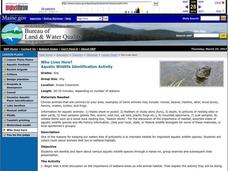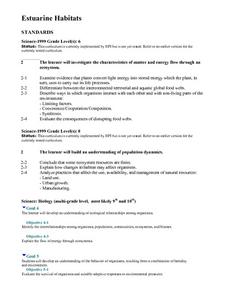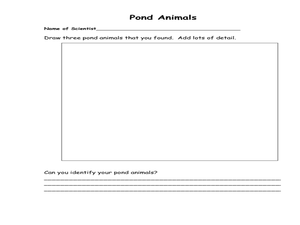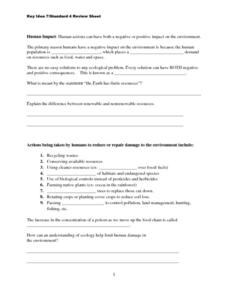Curated OER
Marine & Aquatic Habitats Activities - Aquatic Animals
Students explore importance of marine or aquatic habitats, and investigate habitat characteristics and conditions required by various organisms to ensure survival. They then select an animal to study and design an artificial habitat...
Curated OER
WET Science Lesson #3: Comparison of Aquatic and Terrestrial Plants
Elementary life science explorers compare and contrast aquatic and terrestrial plants (elodea and soybeans) in a Venn diagram. Some background information is provided to support direct instruction, and general instructions are provided...
Curated OER
Who Lives Here?
Students identify various aquatic wildlife species. In this biology lesson students collect clues about animals that live in wetland habitats. Students rotate through several stations displaying particular animal species to collect their...
Curated OER
Estuarine Habitats
Sixth graders study the important habitats, flora, fauna, and physical factors of coastal habitats. They compare the aquatic habitats to terrestrial habitats by researching and completing tables with the information.
Curated OER
The Intertidal Zone
Students research the diverse animal and plant life that inhabit the intertidal zones along the Pacific rocky coast. As students progress through this lesson, they begin to recognize distinct behaviors, adaptations, and characteristics...
Curated OER
Biomes
In this biomes worksheet, students review the characteristics of aquatic biomes and terrestrial biomes. This worksheet has 12 fill in the blank, 6 multiple choice, and 4 short answer questions.
Curated OER
Pond and Pond Organisms
Students explore pond ecosystems. In this pond organism activity, students will use pond water and a plastic bad in order to locate and identify freshwater organisms. The activity is designed for younger grades, but includes an...
Curated OER
World of Insects
In this biology learning exercise, students identify and locate various vocabulary terms related to the world of insects in the puzzle. There are 51 words to locate in the word search.
Curated OER
Fish Fact Rummy
Seventh graders study and explore the base of PA game fish species and characteristics. In this cooperative learning lesson students create a fish fact game by researching information on certain species then play it.
Curated OER
Environmental Science/Water Pollution
Students study natural habitats, aquatic life, renewable and non-renewable resources. They discuss conservation efforts for sea otters and desert toad in this units.
Curated OER
Amphipods
Students identify organisms that live at the bottom of the body of water. In this biology instructional activity, students evaluate the effects of pollution to amphipods population. They examine collected data and create a bar graph...
Curated OER
Lake and Pond Study
Students examine the habitat and community structure of a pond that could support Ospreys through games and worksheets. They then go on a field trip to a pond to evaluate the suitability of the pond as an Osprey habitat.
Curated OER
Plant And Animal Adaptations
Students examine plant and animal life while looking at the environments the organismisms live in. They determine how form follows function by looking an aquatic turtle and noticing its feature of adaptation features. They work in groups...
Curated OER
"For the Birds" [part I]
Students identify birds that appear in Chinese and Japanese art, learning about
their physical characteristics, classifying them according to scientific principles, and exploring their habitats and migration patterns. This is part one...
Curated OER
Mighty Macroinvertebrates
Seventh graders identify the names and features of macroinvertebrates found in Turtle River. In this ecology instructional activity students use digital microscopes and take pictures of invertebrates.
Curated OER
Speedy Succession
Fifth graders identify how a pond can change into a grassland. An ecosystems lesson where learners identify pioneer and climax species, and recognize that ecological succession can take up to 100 years or more. Some excellent activities...
Curated OER
Fall 2003 Midterm Exam #3
Let there be light! When your physics learners take this midterm exam, light will be their focus. They will show what they know about electromagnetic waves, interference, refraction, reflection, lenses, prisms, and more! The test is...
Curated OER
Speedy Succession
Fifth graders investigate how a pond ecosystem can change into a prairie or grassland ecosystem. They observe a small pond ecosystem in a two liter soda bottle, and examine and record changes over a two-week period of time on a worksheet.
Curated OER
Protists
In this protists worksheet, students will read about the different kinds of protists including protozoans, algae, and molds. Students will then complete 2 short answer questions and 1 true or false question.
Curated OER
Standard 4 Review-Human Impact
In this human impact on the environment worksheet, students fill in the blanks to complete sentences about how humans have negatively affected the environment. They complete sentences about the actions taken to reduce and repair the...
Curated OER
Water Quality Survey: Monitoring the Sustainability of Pigeon Creek
Students research the History of Pigeon Creek (or any watershed in your area). For this environmental science lesson, students conduct field tests such as pH and nitrates. They collect data and compare what they collected with other groups.
Curated OER
Leaf - It's What's for Dinner
Students discover correlations in food preferences of invertebrates, and assess stream health through use of kicknets, invertebrate keys, CBL systems and probes.















!["For the Birds" [part I] Lesson Plan "For the Birds" [part I] Lesson Plan](http://content.lessonplanet.com/resources/thumbnails/122462/large/cgrmlwnvbnzlcnqymdeymtaxny0ynji5lwd4n2h5by5qcgc.jpg?1414222903)







